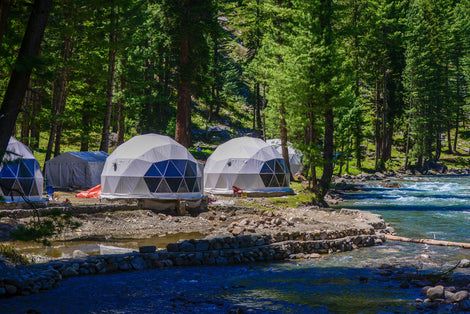Energy Storage Problems in Cold Temperatures
When it gets cold outside, a lot changes in an off-grid solar setup. One of the trickiest parts is keeping your energy storage working like it should. Batteries don't always perform well when temperatures drop. For people living off-grid, that can lead to power loss right when they need electricity most during long, dark winter nights. It's not just about comfort either. If your power goes out, so does your ability to keep water pumps, lights, and heat sources running. That's a big deal when living away from the grid.
Energy storage plays a key role in every off-grid solar kit. Even if your panels are working fine, cold weather can throw off how your batteries store and deliver electricity. Knowing what kind of problems to expect and how to deal with them can help keep your power reliable all season. Whether you're new to off-grid living or just gearing up for another winter, it's smart to understand how low temps can mess with your batteries and what you can do to keep them going strong.
Why Cold Temperatures Impact Battery Performance
Cold weather slows everything down, including batteries. The chemical reactions inside a battery move slower when temperatures drop. That means your batteries might charge slower and hold less power than they would during warmer months. Even if your solar panels are bringing in enough sunlight, your battery might not take it in as easily or give it back the way you expect.
Here are a few common problems off-grid users run into when the temps fall:
- Reduced capacity – Your battery may show it's fully charged, but the power you get out of it is less than normal
- Slower charging speeds – Batteries can take longer to top off because cold conditions resist internal charging reactions
- Voltage drops – When it's cold, battery voltage can dip faster, making them feel like they're drained more quickly than usual
- Risk of freezing – In extreme cold, some battery types can freeze, which may cause permanent damage
A good example of this is a cabin using a standard deep cycle battery bank in a remote location. On a mild day, everything works fine. But once temperatures dip well below freezing, the batteries start to lose charge quicker than expected.
Even though the solar panels are still feeding it power, the output just isn't keeping up. Without storage that handles cold well, people end up using backup generators or going without certain appliances altogether.
Understanding these limits can help you plan better. It's not always about avoiding cold. Sometimes it's about knowing how your gear behaves in cold and being ready for those changes. That's where selecting the right type of battery becomes part of the solution.
Types Of Batteries And Their Cold Weather Suitability
Some batteries hold up better in winter than others. When choosing the right type for an off-grid solar kit, it's worth knowing how each option handles cold.
1. Lithium-Ion Batteries
These are known for being light, compact, and long-lasting. They work well through a range of temperatures, but they don't like charging when it's below freezing. Charging them cold can cause damage unless they come with built-in heating elements or controls that stop charging during extreme cold.
2. Lead-Acid Batteries (Flooded or AGM)
These batteries are more affordable and pretty reliable. They tend to handle cold a bit better when it comes to charging, but the tradeoff is lower energy efficiency. Flooded models need regular checks, and both types carry a risk of freezing if they're not kept in a protected space.
3. Gel Batteries
These are a type of lead-acid battery with a thicker internal material. They perform better in low temperatures than flooded batteries and are less likely to leak, but they still lose capacity when it gets very cold.
When looking at battery choices for cold climates, it's a balancing act between safety, energy efficiency, and how much maintenance you're willing to do. Some off-grid systems mix battery types or use batteries designed specifically for low-temperature use. Others rely on extra insulation or heating to get better results out of basic systems.
Either way, picking the wrong one can mean regular power dips, even when your solar input stays strong. As winter settles in, staying powered can often come down to how well your storage matches the season.
Solutions And Best Practices For Battery Storage In Cold Weather
Keeping your off-grid solar battery storage efficient through the winter takes a mix of planning and smart setup. Cold air doesn't just hit your cabin. It seeps into battery boxes, storage sheds, and any unprotected space. That can lead to frozen batteries or poor performance. The goal is to create an environment where your batteries stay warm enough to do their job without constantly needing extra input or risk damage.
Here's a list of tips to help keep batteries working well through the cold months:
1. Insulate your battery enclosure
A simple foam board or weather-resistant insulation wrap can make a big difference in holding in heat from your batteries' normal discharge cycle.
2. Use battery heaters or heating pads made for batteries
These low-voltage warmers keep batteries above freezing without draining energy like a space heater would. Some work on thermostats and only kick in when temps drop too far.
3. Keep your batteries out of wind-exposed areas
Even if your storage shed is insulated, gaps or drafts will wreck temperature control. Make sure things are sealed tight where your batteries are kept.
4. Install your batteries in temperature-stable structures
Basements, garages, or sheds that share walls with heated living areas offer better insulation without turning into ovens in the summer.
5. Avoid charging lithium batteries below freezing
If you're using lithium, make sure your charge controller knows when to pause charging, or consider models with built-in temperature controls.
Even with the right insulation or heating tools, location matters. Batteries should be placed where they won't overheat during the summer but can stay cozy during winter. Letting them freeze, even once, can lead to problems that don't always show up right away. And once performance drops in extreme cold, it rarely gets back to normal until everything thaws out.
Benefits Of Using BatteryEvo Storage Solutions
The BatteryEvo storage solution is built with temperature impact in mind. When cold weather hits, these systems help stabilize how your batteries respond instead of letting the freezing temps take over. These setups can improve performance by managing how the system handles charging and heat distribution.
BatteryEvo products often come with materials that help protect against outside air exposure. Some options include temperature control features or pre-built enclosures with better insulation than standard setups. That makes them good choices for off-grid folks who don't want to spend time retrofitting DIY boxes or layering foam every season.
If your power needs go beyond basic lights and charging, dependable winter storage becomes a top priority. Living off-grid and losing power every night due to a cold battery can wear thin fast. BatteryEvo aims to keep those dips from happening, especially when the days are short and solar input is limited. Whether you're pulling energy for a well system or just trying to keep food cold, consistent power makes all the difference.
With fewer moving parts and better design for year-round use, systems built around BatteryEvo usually mean less worry and fewer power surprises. That gives you the freedom to focus on your day-to-day, even when the temperature outside is swinging below zero.
Maintaining Your Battery System Throughout Winter
Preventing cold-related battery issues doesn't stop once you're set up. It requires week-to-week attention through the season. A solid maintenance plan helps catch problems early and keeps your solar storage system working when you need it most.
Here's how to keep your off-grid battery system steady during the cold:
- Check battery voltage more often than you would in warmer seasons. Cold batteries drop faster and recover slower
- Look out for visible signs of stress like fogged terminals, bulging cases, or signs of frozen fluids in flooded cells
- Keep snow and ice cleared off your solar panels. Low sun hours already mean reduced charging time. Make the most of every ray
- Use a battery monitor that tracks temperature and charge levels in real time. That way, if performance starts to dip, you'll spot it before it's too late
- Make sure all wires, fuses, and inverters are checked monthly. Cold can make brittle parts fail when you least expect it
Think of this routine like car maintenance in the winter. Just like your car battery works harder when it's cold, so does your solar storage. Small checks now help avoid bigger hassles later, like suddenly finding out you can't power your well pump before sunrise.
Keep Your Solar Energy Storage Reliable All Winter Long
Living off-grid comes with its own rhythm, and winter can be the trickiest part of that cycle. Short days, long nights, and freezing temps put pressure on every piece of your solar setup, especially your batteries. That's why having a plan to deal with cold storage issues makes such a big difference. From insulation to battery type, every choice matters when it's below freezing and you're relying on your system for heavy lifting.
Reliable battery storage doesn't just happen. It's built through good choices, regular checks, and the right support systems. With the proper setup, winter doesn't have to mean extra stress or unexpected outages. Instead, it just becomes another season your off-grid home is ready to face head-on.
Ensure your off-grid solar setup stays reliable this winter with the right solutions. Explore the advantages of the off grid solar panel kit with a battery and inverter to safeguard your energy storage against cold weather challenges. Green Vista Living makes it easier to build a system that keeps your power steady all season long, without the guesswork.







